
Background information
Losing a tuft of hair every day? What hair loss reveals about your health
by Moritz Weinstock

Hair is a science in itself, and Rob Smith's job. This scientist does research for Dyson and has answers to my styling and care questions. Some of them even wipe the slate clean of certain beliefs.
Rob Smith helped his former employer develop razors, aka hair removal. Today, the 38-year-old Briton is on a mission to help us keep our hair as long and healthy as possible. As Senior Principal Scientist at Dyson, he and his team are conducting scientific experiments under laboratory conditions at the Malmesbury research and development campus. This knowledge should make it possible to style hair better and, more importantly, avoid damaging it. After ten years with the technology company, a lot of knowledge has accumulated and I can tap into this during an interview with the hair scientist.
Rob, why does our hair need to stay healthy? After all, hair is only made up of dead cells.
Rob Smith, Senior Principal Scientist at Dyson: as soon as your hair leaves your scalp, it is, in effect, completely dead. If we let our mane grow, however, it will stay with us for many years. Damaged hair becomes brittle, unattractive and unpleasant to touch. So if we damage our hair, there's nothing we can do about it. All we can do is hide the damage. That's why it's important not to let it happen, or at least to minimise it. My job is to find out how to maximise styling while minimising damage. To do this, we need to understand how hair grows and focus on the scalp.
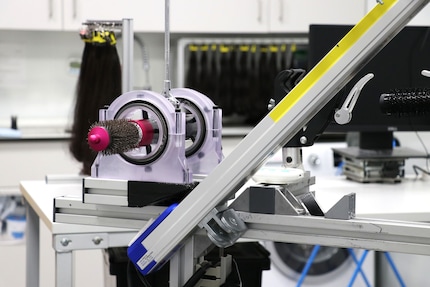
**What role does our scalp play in hair health?**
Over the last ten years, numerous studies have shown us the link between a healthy scalp and good hair quality. When a healthy scalp is out of balance, this can lead to problems such as dandruff or impair hair growth. The latter results in a smaller hair diameter or a less smooth hair surface.
**Interesting ...**
Our scalp is made up of different layers. The top layer, also known as the "stratum corneum", assumes a barrier function and plays a key role in maintaining a healthy scalp. Women's scalp tissue is around twenty per cent thicker than that of men. People suffering from hair loss, for example, generally have a thinner scalp. So when we develop hairdressing products, we need to make sure that our tools are designed in such a way as not to have a negative impact on the health of our scalp.
**I've got some catching up to do. My scalp was hardly a theme in my hair care routine.**
Every study conducted over the last ten years shows that a healthy scalp is the foundation of healthy hair. In other words, if you take action right from the start of your hair's formation, you have a positive influence on its health. The top layer of skin is important because of its barrier function. When intact, it protects the skin from dehydration, external toxins, bacterial attack or disruption of keratin production.
**What if it doesn't?**
When the lipids that hold skin cells together are damaged and destroyed, this leads to a loss of moisture. The dry, porous layer of skin leads to the formation of dandruff or the onset of irritation and skin diseases such as psoriasis or seborrhoeic dermatitis. Finally, a poor condition of the scalp can also make the surface of the hair rough, make it less shiny and, in the worst case, lead to hair loss.
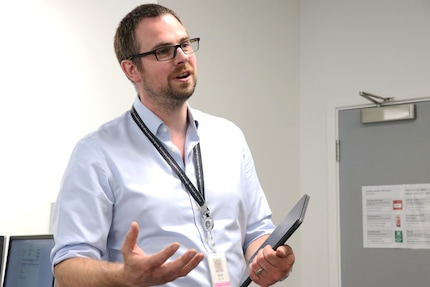
**Can I measure the moisture loss in my scalp?**
Yes, you can. It's a bit complicated because hair gets in the way a bit, but the principle is to put a beaker on the skin and measure the moisture in the beaker after a certain amount of time. This tells us what is known as transepidermal water loss.
**Are there other influencing factors that affect my scalp?**
Yes. Hormones, diet, UV damage, air pollution and the ageing process are all part of it.
**How does ageing of the scalp affect my hair?**
As we've already mentioned, the growth of our hair is closely linked to the thickness of our scalp. With age, the barrier function deteriorates: the skin thins because our skin cells multiply more slowly. As a result, surface temperature falls slightly, hair diameter and density decrease and hair becomes thinner. Eventually, pigmentation is also affected. In short, the scalp loses vitality, resulting in grey hair and slower hair growth.
**What can I do in practical terms to avoid damaging my scalp?**
As well as overheating the skin, avoid hairstyles such as ponytails or hair extensions. They exert too much traction on the hair follicles, which can lead to hair loss. Keep your scalp clean, as sebum is a kind of food for the microbes on your head. They feed on it and then convert it into a substance that irritates your scalp, which in turn leads to dandruff. Another important thing: watch out for the sun. People with long hair have an advantage, as it offers a certain amount of protection to the scalp. The melanin in the hair transforms UV rays into heat. My short hair makes it harder to maintain a healthy scalp.
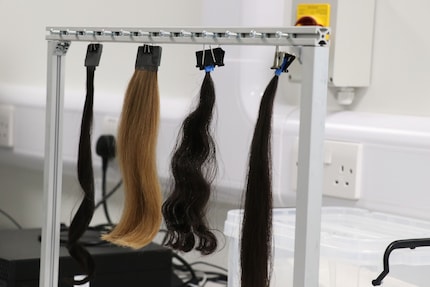
**How often do I need to wash my hair to keep my scalp clean?**
The ultimate question. When we wash our hair, we remove sebum. In small amounts, however, sebum is important for our hair, as it supports the skin barrier and keeps the skin hydrated. If you wash your hair too often, you deprive it of this natural moisturiser. However, if you have too much sebum, you'll have to deal with microbial problems.
**I have a feeling: there's no magic number you can give me.**
It's very individual. It's up to you to find the right balance. Washing your hair frequently can cause just as many problems as not washing it often enough. But if you have dandruff or a dry, itchy scalp, it can be a good idea to wash your hair more often because of germs.
**This is counterintuitive. What about the temperature of the water? Does it affect our scalp or hair?**
Yes, but only to a certain extent. Generally speaking, our bodies notice when a temperature is too extreme for us. If the water was too hot for your scalp, you'd get out of the shower. The influence of temperature differences between water at 34, 38 and 40 degrees is minimal. This is also explained by the fact that the time we spend in the shower is relatively short.
**And what about radiance? Some people swear by rinsing hair with cold water to make it shinier.**
I tried to replicate this effect in the lab and didn't succeed. What we do know: once hair gets wet, the scale layer swells, making hair rougher. A rough surface doesn't reflect light as well as a dry, smooth surface. If you want to close the scale layer, you need to dry your hair. Cold water may swell the scale layer less than hot water, but it still roughens the surface. If you wash your hair in cold water from the start, the scale layer will swell a little less. But if you wash it in hot water first and then switch to cold water, nothing changes in terms of the swelling of the scale layer.
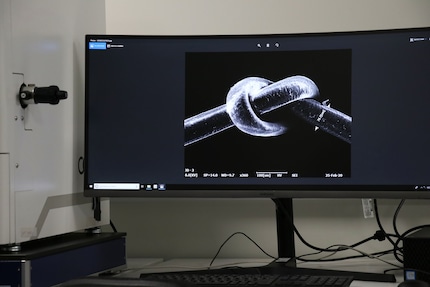
**We've already succinctly touched on the topic: I recently learned from one of your lectures that our scalp has a microbiome.**
My favourite fact is that the human body has more microbial cells than human cells. However, in terms of mass, human cells predominate.
**How important is our scalp microbiome?**
The more research we do into microbiomes, the more we see the extent of their real influence. For example, the state of your skin is highly dependent on your skin microbiome. If you disturb the microbiome, it can lead to skin irritation, inflammation or dandruff. The microbiome therefore plays a central role in maintaining our skin barrier. In fact, dandruff is one of the most common symptoms of a malfunctioning skin barrier. That's why the world's best-selling shampoo is also Head & Shoulders, i.e. an anti-dandruff product.
**Let's talk about hair growth. What do I need to know about it?**
Around 90% of your hair is growing at the moment. They are in the so-called anagen phase. Hair typically remains in this phase for between two and six years. A hair normally grows by 0.9 centimetres a month and can reach up to a metre in length before falling out. The speed at which a hair grows depends on our genetics. The remaining ten per cent of your hair is in the telogen phase. In this phase, the hair detaches from the hair follicle and falls out. This represents between 50 and 80 hairs a day. After a three-month rest period, the hair cycle starts again and a new hair is formed.
**What influence does age have on hair growth?**
The older we get and the weaker our skin barrier becomes, the longer our hair remains in the telogen phase. This means that the number of hairs in the growth phase decreases.
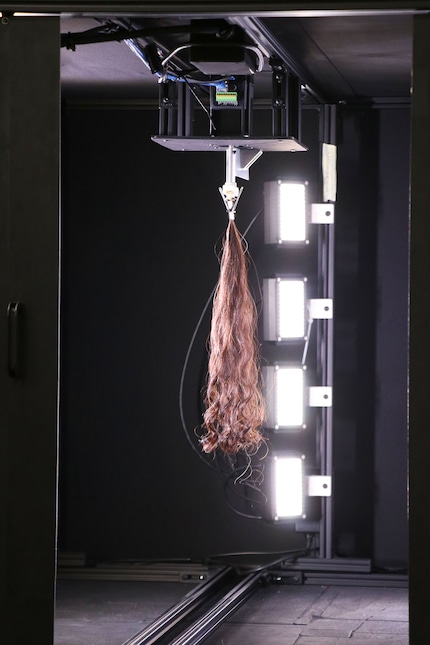
**Are there other things that can have a negative influence on our hair growth?**
Our diet, stress, hormonal imbalances and various medications can all put the brakes on hair growth.
**It seems that there are products that promote hair growth. What do you think of such preparations?**
These preparations can be divided into two main groups. The first group is multivitamins. The scientific evidence for multivitamins in terms of improving hair as part of a healthy, balanced diet is relatively weak. But if you have an iron deficiency, for example, a dietary supplement can help.
**And the second group?**
These are preparations for hair growth. The best known is finasteride, an oral tablet. Minoxidil, which is applied to the scalp, is also well known. These two products aim to boost hair follicles in the anagen phase and keep them there for as long as possible. For some people, these preparations are highly effective, while for others they are not. More side effects have been observed with finasteride. From the point of view of proof of efficacy, however, both are very good.
**Nothing destroys hard-won length faster than brittle hair. Why does it come to this?**
To put it simply, our hair is made up of two layers. The cortex, which gives the hair strength and elasticity, and a layer of scales that surrounds and protects this cortex. The scales are also responsible for the hair's shine and softness. If our hair is brittle, it's usually because the scale layer is wearing down or weakening. Sometimes, the cortex can even be directly damaged.
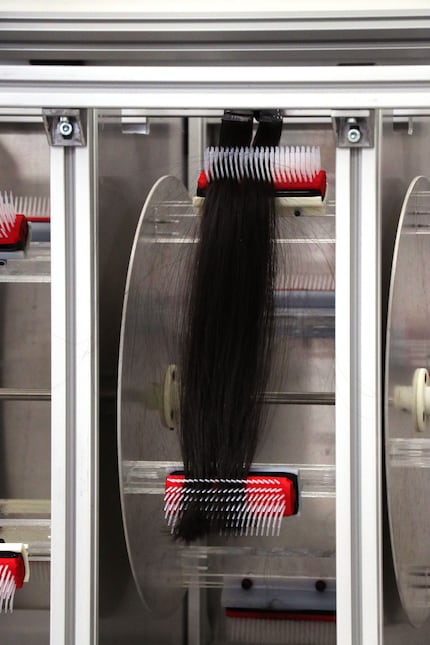
**Is too much heat the reason for brittle hair?**
Heat is the number one cause of damage done to hair. But there are other causes too, such as colouring and bleaching hair. Or going to bed with wet hair. When hair is wet, the outer layer of scales is swollen, which means that the scales protrude and the cortex is not protected. The cortex is more fragile. Heavy rubbing on the pillow can cause damage that leads to breakage. Short hair is also more exposed to rubbing during sleep, which can have an influence.
**How reliable are the thermal protection products we apply to our hair before styling?**
Some protect reliably, but not all. We've found that some products actually lower the heat that actually hits the hair, which reduces damage, but at the same time reduces styling effectiveness. Some products even have the opposite effect. They transmit the heat even more effectively to the hair. Other products do little more than transport moisture into the hair, which, according to our research, can also cause more damage. For example, if you work on damp hair with a hot iron. So it's important to work with as little heat as possible from the start.
**What would happen if I ran a hot straightening iron through my wet hair?**
When water evaporates, it expands. If you wedge your hair between two hot irons, you heat up the moisture in your hair, bringing it to boiling point in a matter of seconds while it was still at room temperature. The steam is forced to force its way through instead of gently working its way out of the hair and only then evaporating at the surface. Added to this is the fact that the plates are an obstacle. This causes microfractures and the hair becomes weak in these areas.
Header photo: Natalie Hemengül
As a massive Disney fan, I see the world through rose-tinted glasses. I worship series from the 90s and consider mermaids a religion. When I’m not dancing in glitter rain, I’m either hanging out at pyjama parties or sitting at my make-up table. P.S. I love you, bacon, garlic and onions.
Interesting facts about products, behind-the-scenes looks at manufacturers and deep-dives on interesting people.
Show all
Background information
by Moritz Weinstock

Background information
by Martin Jungfer
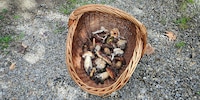
Background information
by Martin Rupf